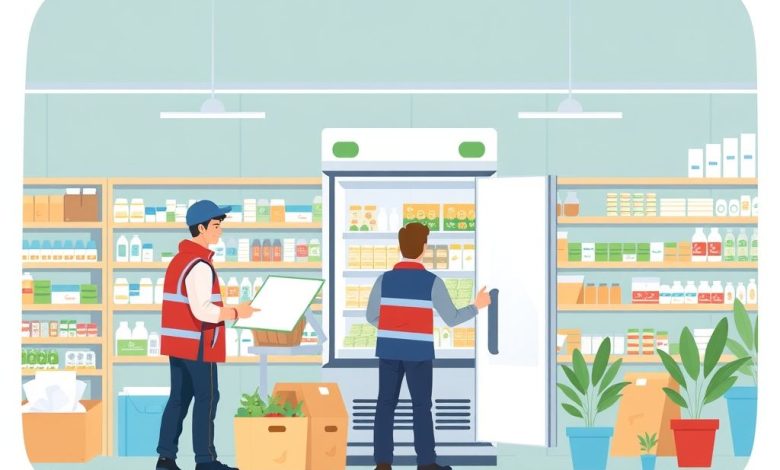Field Service Management for Pharmacy Refrigeration

Introduction
Pharmacy refrigeration systems play a crucial role in maintaining the integrity and efficacy of temperature-sensitive medications. These systems require regular maintenance to ensure optimal performance and prevent potential issues such as medication degradation or contamination. Effective field service management is essential for pharmacies to maintain their refrigeration equipment efficiently and minimize downtime.
- Importance of Proper Refrigeration in Pharmacies
- Challenges in Pharmacy Refrigeration Management
- Field Service Management Strategies
- Regular Maintenance Schedules
- Remote Monitoring Systems
- Technician Training and Certification
- Inventory Management Integration
- Best Practices for Field Service Management
- Technology Solutions for Efficient Management
- Conclusion
Importance of Proper Refrigeration in Pharmacies
Proper refrigeration is critical for several reasons:
- Temperature-sensitive medications require precise temperature control between 2°C and 8°C to maintain their potency and safety.
- Improper storage can lead to medication degradation, reducing efficacy or potentially causing harm to patients.
- Refrigeration systems help prevent contamination from bacteria, mold, and other microorganisms.
Challenges in Pharmacy Refrigeration Management
Pharmacies face several challenges when it comes to managing their refrigeration systems:
- Limited space within refrigerators for storing large quantities of medication.
- Need for frequent monitoring and maintenance to ensure consistent temperatures.
- Potential for equipment failure during off-hours when staff may be unavailable.
- Ensuring compliance with regulatory requirements for drug storage.
Field Service Management Strategies
Implementing effective field service management strategies is crucial for maintaining pharmacy refrigeration systems efficiently:
Regular Maintenance Schedules
Develop and adhere to regular maintenance schedules for refrigeration equipment. This includes:
- Daily checks on temperature readings and alarm systems.
- Weekly cleaning of condenser coils and drain pans.
- Monthly inspection of door seals and gaskets.
- Quarterly replacement of water filters.
- Annual professional servicing by certified technicians.
Remote Monitoring Systems
Invest in remote monitoring systems to:
- Track real-time temperature readings and alerts.
- Receive notifications for any deviations from set parameters.
- Identify potential issues before they become major problems.
- Reduce the need for on-site visits and minimize downtime.
Technician Training and Certification
Ensure that field service technicians have the necessary skills and knowledge to handle pharmacy refrigeration systems effectively:
- Provide comprehensive training on system operation and troubleshooting.
- Require certification from recognized industry bodies such as ASHRAE or EPA.
- Stay updated on the latest technologies and best practices in refrigeration management.
Inventory Management Integration
Integrate inventory management systems with refrigeration monitoring:
- Track medication stock levels in relation to available storage space.
- Receive alerts when approaching maximum capacity limits.
- Optimize storage arrangements to maximize efficiency.
Best Practices for Field Service Management
Implement these best practices to enhance field service management for pharmacy refrigeration:
- Create detailed work orders for each maintenance visit, including specific tasks and expected outcomes.
- Use mobile apps for technicians to log issues, schedule appointments, and update status in real-time.
- Implement a tiered support system, with immediate response times for critical issues.
- Conduct regular audits to ensure compliance with regulatory requirements and internal standards.
Technology Solutions for Efficient Management
Leverage technology to streamline field service management processes:
- Automated scheduling systems to optimize technician routes and reduce travel time.
- Predictive analytics to forecast potential equipment failures before they occur.
- Augmented reality tools for remote troubleshooting and training.
- Cloud-based platforms for centralized data management and reporting.
Conclusion
Effective field service management is crucial for maintaining optimal performance of pharmacy refrigeration systems. By implementing regular maintenance schedules, leveraging remote monitoring technologies, ensuring proper technician training, integrating inventory management, following best practices, and utilizing innovative technology solutions, pharmacies can minimize downtime, prevent medication degradation, and ensure compliance with regulatory requirements.
As the healthcare landscape continues to evolve, the importance of reliable refrigeration systems in pharmacies will only grow. By prioritizing field service management, pharmacists can safeguard patient safety, maintain medication efficacy, and contribute to improved public health outcomes.



